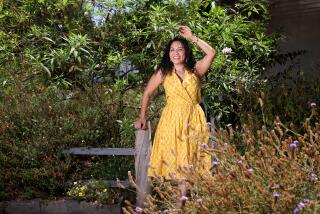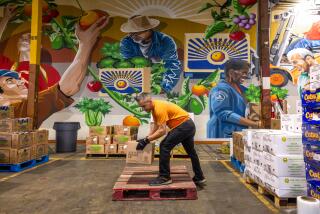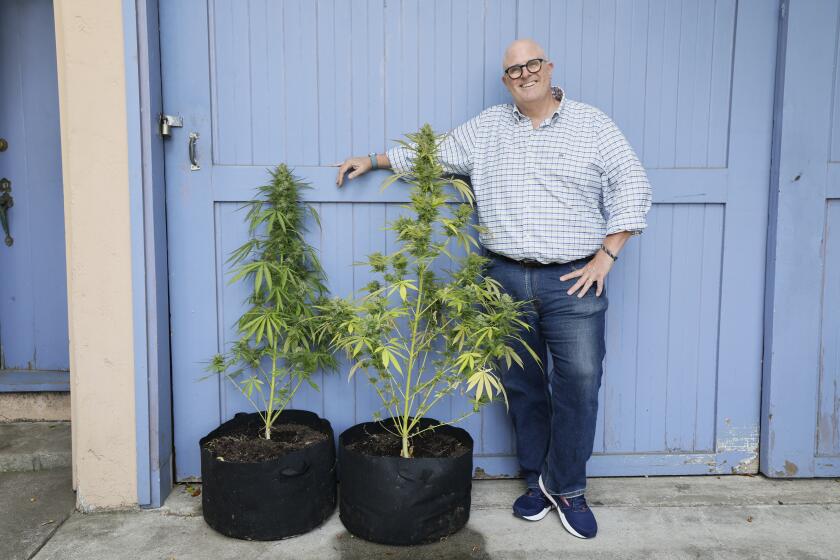Seeding Program in Nationwide Flower
WASHINGTON — Tucked in cramped offices in the nation’s capital, a fertile ground for flowering political careers, are some most unusual green thumbs.
Last year alone, these modern-day Johnny Appleseeds helped to scatter 2.5 tons of seeds that produced $7 million worth of food. And they were planted in all 50 states as part of 6,000 projects for groups ranging from a convent in Santa Barbara to a soup kitchen in Brentwood, Long Island.
It is Operation Green Plant, a little-known national free seed distribution program run by America the Beautiful Fund, a nonprofit group with a tiny staff, a shoe-string budget of $123,000 a year and a goal to help plow corporate seed surpluses into helping hungry Americans.
12 Tons Distributed
Since 1980, when Operation Green Plant got off the ground, America the Beautiful Fund has distributed about 12 tons of vegetable, herb and flower seeds to charitable, educational and community groups.
“This is probably one of the smallest budgets in Washington that does a program that covers all 50 states,” said Nanine Bilski, the national projects director.
In this city, where politicians, lawyers and lobbyists regularly make decisions of global significance, the presence of myriad smaller organizations and their impact often goes unnoticed. And, unlike the marble corridors that identify Washington’s Establishment, America the Beautiful’s offices are a gardener’s delight, overflowing with bins of loose seeds and their colorful packets.
The fund was founded 22 years ago by Bruce Dowling, a former wildlife biologist, and a small group of preservation-minded people who believe that “the citizen involvement that made America great was in danger of being swallowed up by big government programs.”
Encourage Good Citizenship
“Our main goal is to encourage people to practice good citizenship,” Bilski said in an interview. “It’s not something you have--it’s something you do.”
In addition to Dowling and Bilski, who previously taught a film and television course at New York University’s School of the Arts, there are two other full-time workers, two part-time staff members and a handful of volunteers--some of whom are assigned there as part of required public service work by the District of Columbia criminal court.
But at the core of the fund’s work force is a field staff of about 500 volunteers. Dowling stressed that such volunteers are crucial to the success of small organizations such as his.
“It’s like David and Goliath,” said Dowling, a rumpled, self-effacing man who is now executive director of the fund. “We can do a gargantuan program with a lot of volunteers. We can bypass a lot of forms and lost energy.”
Firms Donate Seeds
To make Operation Green Plant work, major seed companies have donated $1 million in seeds left in their stock after the planting season that still have a germination life of 85% or 90%. Companies such as Park Seed and Harris Seed have sent individual packages as well as bulk vegetable seeds, while others have provided flowers. The fund also relies on grants from foundations and contributions from corporations and individuals.
Dowling spends a good deal of time assessing proposed projects and inquiries from groups ranging from SLUG--the San Francisco League of Urban Gardeners--to the Gump Gater Garden Project, which helps physically and mentally handicapped students in Louisiana.
Serve as Models
What he seeks are projects that can serve as models for others to emulate. “If we’re not doing that, we’re not spreading the movement,” he said.
In Oroville, Calif., David Coiner, a retired production manager for Atari, said he recently requested seeds to plant on five acres belonging to his son-in-law. He plans to donate the food produced on the land to “gleaners,” who pick remaining fruits and vegetables from fields after farmers have finished their harvest and donate the food to the needy.
Projects for Inmates Aided
While providing food remains a key goal, the fund also has seeded projects that involve horticultural projects for prison inmates, mental patients and handicapped children.
Seeds also go to individuals like Marcola Gonzalez, who applied to the New York City Housing Authority for a plot of land to garden.
“Soon the flowers were growing and, to my surprise, so were our neighbors,” her daughter Isabel wrote in a letter to Dowling. “People just stopped to talk to each other. I don’t know if it was just that they finally had something to talk about or the fact that my mother gave the passers-by free vegetables and flowers.”
For Dowling, such letters are proof that the fund’s message is being spread.
“All we do is to give a helping hand at a strategic time,” he said. “Seeds are better than money.”
More to Read
Sign up for Essential California
The most important California stories and recommendations in your inbox every morning.
You may occasionally receive promotional content from the Los Angeles Times.










